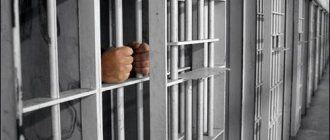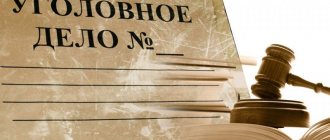A suspended sentence as a mitigating measure is applied by the judiciary in cases where the possibility of correcting a convicted person outside the place of imprisonment has been established, if the crime committed does not fall into the category of categories of offenses prohibited for replacing real imprisonment with suspended sentences.
Multi-channel free hotline Legal advice on criminal law. Every day from 9.00 to 21.00
Moscow and region: +7 (495) 662-44-36
St. Petersburg: +7 (812) 449-43-40
Article 73 (suspended sentence)
Art. 73 of the Criminal Code of the Russian Federation determines the possibility of replacing, by decision of a judicial authority, real imprisonment with a suspended sentence.
Such possibilities include the following cases:
- labor activity of a corrective nature;
- the presence of a serviceman in a military disciplinary unit;
- stay in places of detention, the term of stay in which according to the sentence is less than eight years.
If the crime committed by the convicted person belongs to one of these types, the real term for it can be replaced by a court decision with a suspended sentence.
In addition to the categories of applied punishments that allow an alternative to real terms, there are several categories of criminal offenses, after the commission of which conditional types of punishment are never applied.
These categories include the following crimes:
- Against the sexual integrity of children under fourteen years of age.
- Providing assistance in carrying out terrorist activities, its propaganda or approval.
- Participation in terrorist communities.
- Hostage taking.
- An attack against people or organizations that are internationally protected.
- Committing a crime of high or special gravity at the stage of the probationary period during a previously established suspended sentence for a crime with direct intent.
- Committing a crime with direct intent during the period of replacing part of the prison term with parole.
- Crimes that are a relapse (simple and dangerous).
Each of these categories completely excludes the possibility of using an alternative punishment to imprisonment.
When considering the option of applying an alternative correctional measure, the court determines the degree of danger of the committed act for society, the nature of the offense, the personal qualities of the convicted person, and various circumstances related to mitigating or aggravating guilt.
If the court decides to apply a conditional sentence, the offender is given a certain period of time during which the offender must prove by his actions and proper behavior that he is fully aware of his wrongful actions, has repented and corrected himself.
Art. 73 of the Criminal Code of the Russian Federation establishes the length of time for checking the correction of a convicted person.
The deadlines are determined as follows:
- if a guilty verdict passed by a court establishes imprisonment for a term of less than a year, or a more lenient punishment is established, the limits of conditional punishment are calculated from six months to three years;
- If a guilty verdict imposed by a court establishes imprisonment for a term of more than a year, the minimum term remains the same, and the maximum increases to five years.
The judicial body has no right to go beyond these boundaries, either more or less.
The beginning of the calculation of the suspended sentence is the day the guilty verdict enters into force. This period also includes the period of time from the date of proclamation of the court decision at the hearing.
If criminal liability for an offense has been imposed in the form of keeping the offender-military in a military disciplinary unit, the probationary period is limited to the period remaining until the end of service at the time the conviction is announced.
Replacing actual imprisonment for a certain period with a suspended sentence does not prohibit the court from imposing additional corrective measures on the convicted person.
When assigning a conditional sentence, the court, based on the ability to work, age, health, establishes a number of restrictions on the activities of the convicted person.
These include the following restrictions:
- Prohibition on changing the place of permanent residence without notifying the supervisory authority.
- Prohibition on changing the place of study or employment without notifying the relevant control authority.
- A ban on visiting a certain range of events and places.
- Obligation to complete a course of getting rid of alcohol, toxicological or other types of addictions, treatment of sexually transmitted diseases (if necessary).
- The obligation to officially find a job, be reinstated at the place of study, and the like.
In addition to these duties, the court may impose other sanction measures that should contribute to the correction of the convicted person.
The implementation of the imposed sanctions measures is controlled by special state-level bodies. If punishment is imposed on a military serviceman, control is carried out by the command of the institution or military unit to which the convicted person belongs.
The control and supervisory authority has the right to submit to the court a proposal to change the scope of duties of a conditionally convicted person in the direction of reducing or increasing the number of duties.
Everything about criminal cases
Go to the Criminal Code
Url Additional information:
Conditional sentence
- Part 1 73 of the Criminal Code
conditionally, if correction is possible without actually serving
Types of punishments that can be suspended:
- Part 1 73 of the Criminal Code
correctional labor
- Part 1 73 of the Criminal Code
military service restriction
- Part 1 73 of the Criminal Code
content in the disciplinary section
- Part 1 73 of the Criminal Code
imprisonment, may be suspended if the term is up to 8 years
- part 4 73 of the Criminal Code
with probation, they may impose an additional sentence
When a suspended sentence is not given
- clause "a" part 1 73 of the Criminal Code
not assigned conditionally against immunity for up to years
- clause "a.1" part 1 73 of the Criminal Code
not given a suspended sentence for terrorist offenses
- clause "b" part 1 73 of the Criminal Code
is not assigned to probation again for a serious crime during the period of probation
- clause "c" part 1 73 of the Criminal Code
not conditionally assigned if there is a dangerous relapse
What is taken into account for probation?
- part 2 73 of the Criminal Code
Circumstances that influence the assignment of a suspended sentence:
- part 2 73 of the Criminal Code
nature of public danger
- part 2 73 of the Criminal Code
degree of public danger
- part 2 73 of the Criminal Code
identity of the culprit
- part 2 73 of the Criminal Code
extenuating circumstances
- part 2 73 of the Criminal Code
aggravating circumstances
Probation
- Part 3 73 of the Criminal Code
probationary period is a period to prove correction
- Part 3 73 of the Criminal Code
if the punishment is up to 1 year, the probationary period is up to 3 years
- Part 3 73 of the Criminal Code
if the punishment is more than 1 year, the probationary period is up to 5 years
Calculation of the probationary period
- Part 3 73 of the Criminal Code
calculated from the moment the sentence comes into force
- Part 3 73 of the Criminal Code
the time elapsed from the day the verdict was announced is counted
- Part 3.1 73 Criminal Code
in the disciplinary part, the term is within the service period
Responsibilities during the probationary period
- part 5 73 of the Criminal Code
do not change your permanent place of residence, work, study
- part 5 73 of the Criminal Code
don't go to certain places
- part 5 73 of the Criminal Code
undergo treatment for alcoholism and drug addiction
- part 5 73 of the Criminal Code
find a job, continue education
- part 5 73 of the Criminal Code
other responsibilities may be assigned
- part 7 73 of the Criminal Code
responsibilities can be canceled or added
Control over the convicted person
- part 6 73 of the Criminal Code
control over the convicted person is carried out by the Federal Penitentiary Service
Note
— approx. to 73 CC
What are crimes against persons under 14 years of age?
Plenum of the Supreme Court
Plenum
on the practice of applying conditional sentences dated March 4, 1961 No. 1
Additional Information
- paragraph 61
Plenum No. 58, features of the application of Article
73 of the Criminal Code
- clause 18
Plenum No. 9, in the event of a suspended sentence, the type of institution is not assigned
Practical aspects
Conditional sentence
, possibilities of applying norm
73 of the Criminal Code
SITUATIONS from practice
Probation
in case of relapse: is it possible, how can norm
64 of the Criminal Code
?
Article 73 of the Criminal Code. Conditional sentence
Url Additional information:
- P.
Plenum No. 1 prohibition of suspended sentences for serious offenses
1) The court decides to consider the imposed sentence suspended,
Url Additional information:
Accounting for the category of crime
- P.
Plenum No. 1 is suspended if the crime is not of great danger
- P.
Plenum No. 1 prohibition of suspended sentences for serious offenses
if it comes to the conclusion that it is possible to correct the convicted person without actually serving the sentence, prescribing:
—
correctional labor,
— restrictions on military service;
— content in the disciplinary part;
- imprisonment for up to 8 years.
A suspended sentence is not imposed:
a) those convicted of
crimes against the sexual integrity of persons under 14 years of age ;
a.1) convicted for crimes provided for in Part 1
-
Part 2 205.1
,
205.2
,
Part 2 205.4
,
Part 1 - Part 3 206
,
Part 4 210 Criminal Code, 210.1 Criminal Code and 360 Criminal Code ;
b) when
committing a serious or especially serious crime:
- during the probationary period for a conditional sentence imposed for committing
an intentional crime,
- or during the unserved part of the sentence imposed for committing an intentional crime for parole;
Url Additional information:
Probation for reoffending
Relapse does not rule out
possibility of a suspended sentence if the relapse is simple
c) in case of dangerous and especially dangerous relapse.
Url Additional information:
Five circumstances
Five circumstances
to be taken into account for the purpose of a suspended sentence
2) When assigning a suspended sentence, the court takes into account:
Url Additional information:
— clause 1
Plenum No. 58 the nature of the hazard depends on the characteristics of the composition
- P.
Plenum No. 1 is suspended if the crime is not of great danger
Nature of the danger
The nature of public
dangers: consideration in sentencing
- the nature of the social danger of the crime committed,
Url Additional information:
- P.
Plenum No. 1, when placing a suspended sentence, the circumstances of the case are taken into account
Danger level
Degree of public
dangers: consideration in sentencing
- the degree of public danger of the crime committed,
Url Additional information:
- P.
Plenum No. 1 in the case of a suspended sentence, the identity of the perpetrator is taken into account
- identity of the culprit,
Url Additional information:
- P.
Plenum No. 1 takes into account mitigating and aggravating circumstances
Extenuating circumstances
Extenuating circumstances
increase the possibility of probation
— extenuating circumstances,
— aggravating circumstances.
3) When assigning a suspended sentence, the court establishes a probationary period during which the suspended sentenced person must prove his correction by his behavior.
The probationary period must be:
- in case of imposition
of imprisonment for a term of up to 1 year or a more lenient type of punishment - no less than 6 months and no more than 3 years,
- and in case of imposition
of imprisonment for a term of more than 1 year - no less than 6 months and no more than 5 years.
The probationary period is calculated from the moment
the sentence enters into force.
The probationary period includes the time elapsed from the date of pronouncement of the sentence.
Url Additional information:
- clause 62.1
Plenum No. 58, the suspended sentence in the dissertation part may be less than 6 months
3.1) If a sentence is imposed in the form
of detention in a disciplinary unit, the probationary period is established within the limits of the remaining period of military service on the day the verdict is announced.
Url Additional information:
- paragraph 62
Plenum No. 58 conditional to additional punishments - not applicable
, additional types of punishment
may also be 5) The court, when imposing a suspended sentence, imposes on the conditionally convicted person, taking into account his age, ability to work and state of health, the performance of certain duties:
- do not change your permanent place of residence, work, study without notifying the executive inspection,
- do not visit certain places,
Url Additional information:
- paragraph 35
Plenum No. 14 obligation of a course of treatment under articles on drugs
— undergo treatment for alcoholism, drug addiction, substance abuse or a sexually transmitted disease,
- work (get a job) or continue studying in a general education organization.
Url Additional information:
- paragraph 61
Plenum No. 58 other duties not provided for in
Part 5 73 of the Criminal Code
The court may impose on a conditionally convicted person the performance of other duties that contribute to his correction.
Url Additional information:
— 187 PEC
bodies supervising probationers
6) Control over the behavior of a conditionally convicted person is carried out by the executive inspection, and in relation to military personnel - by the command of military units and institutions.
Url Additional information:
— P.13
Plenum No. 21 cancellation, addition of duties on probation
7) During
the probationary period, the court, upon the proposal of the body exercising control over the behavior of the conditionally convicted person, may cancel in whole or in part or supplement the duties previously established for the conditionally convicted person.
Note.
For the purposes of this article, as well as articles 79 , 80, 82 and 97 of the Criminal Code , crimes against sexual integrity of persons under 14 years of age include crimes provided for in articles 131 , 132 , 133, 134 , 135 , 240 , 241, 242.1 , and 242.2 of the Criminal Code committed against persons under 14 years of age.
Return to the Criminal Code
Seek advice
Commentary to Art. 73 of the Criminal Code of the Russian Federation
The latest version of the criminal law clearly defines what a suspended sentence is.
In addition, the legislator has determined that only its main types can be replaced with a conditional form of punishment. If the court is considering the possibility of correcting a person who has committed several crimes without serving a real sentence, it has the right to establish a suspended sentence based on the sum of the terms for all the offenses considered in court in the aggregate.
The following types of criminal sanctions cannot be replaced by a suspended sentence:
- fine;
- compulsory work activity;
- deprivation of the opportunity to carry out a certain type of activity;
- deprivation of the opportunity to occupy certain positions.
When the court makes a decision to replace the term with a suspended sentence, it is necessary to indicate the justified reasons for the decision.
The regulatory framework of court decisions allows us to establish that decisions on choosing an alternative measure of responsibility are made by judges for all categories of criminal offenses. This takes into account the fairness of the relationship between the action committed and the punishment imposed and the real chances of complete correction of the person in order to prevent him from committing new crimes.
If a person on probation violates the rules of conduct established by the court, the supervisory and control body has the right to submit to the court a proposal to increase the probation period or to include additional duties of the convicted person. The court may increase or decrease the terms and add or remove some duties. The court does not have the right to supplement the authority’s requirements with its own options.
Article 73.1. Peculiarities of foreclosure on the debtor's equity securities
1. When foreclosure is applied to the property of a debtor - the owner of uncertificated issue-grade securities, as well as immobilized certificated issue-grade securities or deposited for other reasons with the depository, such securities are seized in accordance with Article 82 of this Federal Law.
2. Within three days from the date of receipt of the writ of execution from the claimant or bailiff, the person who records the debtor’s rights to equity securities fulfills the requirements contained in the writ of execution for debiting from the personal account or from the debtor’s securities account and crediting to the personal account or the depository account of the claimant of issue-grade securities or makes a note about the complete or partial failure to fulfill the specified requirements due to the absence of issue-grade securities in the debtor's accounts sufficient to satisfy the claims of the claimant.
3. Securities are written off from the personal accounts (custody accounts) of the owner of the securities. It is not allowed to write off securities recorded on personal accounts (custody accounts) of a nominal holder or other accounts.
4. In case of reasonable doubts about the authenticity of the writ of execution received directly from the claimant (his representative), or doubts about the reliability of the information presented in accordance with Part 2 of Article 8.1 of this Federal Law, the person who records the rights to issue-grade securities for verification authenticity of the writ of execution or the reliability of information has the right to delay the execution of the writ of execution, but not more than for seven days.
5. If the issue-grade securities available on the debtor’s personal account or deposit account are not sufficient to fulfill the requirements contained in the executive document for the write-off of issue-grade securities, the person who records the rights to issue-grade securities writes off the issue-grade securities available on the debtor’s accounts and continues further execution as the issue-grade securities are credited to the debtor’s account or accounts until the requirements contained in the executive document to write off the issue-grade securities in full are fulfilled. The person responsible for recording the rights to equity securities immediately notifies the bailiff or the claimant about the write-offs, if the writ of execution was received from the claimant.
6. The person who records the rights to issue-grade securities completes the execution of the executive document in accordance with Part 10 of Article 70 of this Federal Law.
7. Failure to comply with the requirements contained in the executive document is the basis for bringing the issuer of securities, a professional participant in the securities market, to administrative liability in accordance with Part 2.1 of Article 17.14 of the Code of the Russian Federation on Administrative Offenses in the manner established by Article 114 of this Federal Law.
Judicial practice under Article 73 of the Criminal Code of the Russian Federation
An example of a court decision on the issue of serving a suspended sentence is the court hearing in 2021 case No. 4/15-17.
According to the court decision, citizen Polyakov was sentenced to three and a half years for possession of firearms and drugs. The judge came to the conclusion that real correction of the offender is possible without imprisonment, so the defendant’s real sentence was replaced with a suspended sentence of three years. A year later after the sentencing, the control and supervisory authority found that the convict had violated the rules of conduct while on probation, having found him drunk.
After establishing this fact, the authority sent the following submission to the court:
- On extending the term of a suspended sentence.
- About being tested by a narcologist.
- About undergoing treatment in the presence of confirmatory drug tests.
All these proposals were indicated in the submission, despite the statement of the convict that this fact was isolated, and he had no other violations of the conditional regime.
Based on the submission of the control body, the court scheduled a hearing. After hearing the parties and examining the documents presented by the correctional authority, the court found that this violation of the regime allows not only to increase the term of the suspended sentence, but also to register the convicted person with a narcologist and undergo mandatory treatment if the use of narcotic substances is detected.
Thus, the defendant, for being drunk, was sentenced to mandatory registration with a narcologist and an extension of the probation period for two months.





